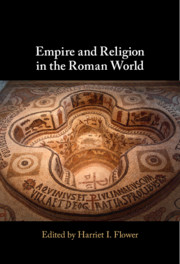Book contents
- Empire and Religion in the Roman World
- Empire and Religion in the Roman World
- Copyright page
- Frontispiece
- Contents
- Figures
- Table
- Contributors
- Acknowledgments
- Introduction
- Part I Empire
- Part II Religion
- Chapter 5 The First Christian Family of Egypt
- Chapter 6 Missionaries, Pious Merchants, Freelance Religious Experts, and the Spread of Christianity
- Chapter 7 Christian Piety in Late Antiquity
- Chapter 8 Ausonius at the Edge of Empire
- Chapter 9 Peregrinationes in Psalmos
- Chapter 10 Muḥammad’s Rivals
- Chapter 11 Brent Shaw
- Appendix: Bibliography of Brent D. Shaw’s Publications to 2020
- Index
- References
Chapter 9 - Peregrinationes in Psalmos
from Part II - Religion
Published online by Cambridge University Press: 26 August 2021
- Empire and Religion in the Roman World
- Empire and Religion in the Roman World
- Copyright page
- Frontispiece
- Contents
- Figures
- Table
- Contributors
- Acknowledgments
- Introduction
- Part I Empire
- Part II Religion
- Chapter 5 The First Christian Family of Egypt
- Chapter 6 Missionaries, Pious Merchants, Freelance Religious Experts, and the Spread of Christianity
- Chapter 7 Christian Piety in Late Antiquity
- Chapter 8 Ausonius at the Edge of Empire
- Chapter 9 Peregrinationes in Psalmos
- Chapter 10 Muḥammad’s Rivals
- Chapter 11 Brent Shaw
- Appendix: Bibliography of Brent D. Shaw’s Publications to 2020
- Index
- References
Summary
This chapter examines the dynamics of the notion of peregrinatio in Augustine’s thought, with particular attention given to its use in the Enarrationes in Psalmos. It uses Derrida’s reflections on metaphor to explore the rich regression of images in peregrinatio. Augustine uses the concept, literally denoting the status of a resident alien, to express the affective dynamics of a Christian living away from their home in the heavenly Jerusalem: their sense of misalignment in the world, but also their sense of joy in the very transience of their existence. For no one can be a peregrinus without having a home from which he has traveled, and to which he looks forward to returning. Derrida’s phrase the “destinerrancy of desire” perfectly captures this Augustinian notion.
- Type
- Chapter
- Information
- Empire and Religion in the Roman World , pp. 212 - 231Publisher: Cambridge University PressPrint publication year: 2021



